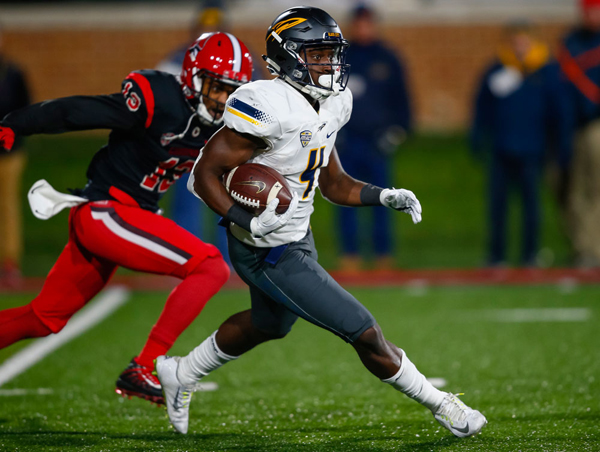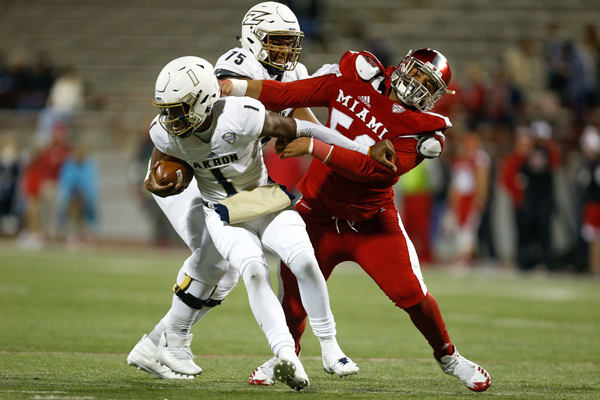In major college football, “Saturdays are for the boys.” But in the Mid-American Conference, it’s Tuesdays, Wednesdays and Thursdays.
There won’t be a single MAC football game in November played on a Saturday.
“Midweek football is here to stay,” said Mike O’Brien, the University of Toledo’s athletic director and a veteran of these non-Saturday starts. “It’s not going away. We know we’re going to have at least two midweek games at home, so we promote them the best we can.”
There was nothing especially extraordinary about the University of Akron’s 21-20 win over Buffalo on Oct. 28, nothing that would make the rest of the country care about a MAC football game more than usual. But there was one thing: Akron’s pre-Halloween game was the last regular-season game in the conference that kicked off on a Saturday.
Sound like a quirk in scheduling? Not really.
The MAC’s unique arrangement is a byproduct of its long-term media deal with ESPN, which runs through 2026-27 and gives the network the ability to move MAC games into midweek time slots on Tuesdays, Wednesdays and Thursdays. In 2016, the MAC had just two Saturday kickoffs in November.
 |
Ball State-Toledo and Miami-Akron are just a couple of Mid-American Conference games played on weekday nights this season.
GETTY IMAGES |
ESPN likes the non-Saturday tilts because they provide live college football in prime time for ESPN2 and ESPNU during the week when they need programming. The conference, which was an early adopter to midweek football going back to 1999, bought in because the scheduling flexibility represented more money and national exposure.
The MAC’s deal with ESPN grosses about $10 million annually, which puts it well ahead of Conference USA and the Sun Belt financially, just behind the Mountain West, and a ways behind The American among the group of five conferences.
ESPN also sublicenses MAC games to CBS Sports Network, another source of revenue that can be shared with the conference.
Early in the season, MAC teams mostly play on Saturdays, but as the season progresses, most league games are played during the week.
The conference and its catchy slogan “MACtion” have become so synonymous with football during the week that the conference often hears from fans in September wondering why there aren’t any midweek games on ESPN yet.
“There’s clearly an association there,” said MAC Commissioner Jon Steinbrecher. “We’re trying to balance a lot of things, but I think we’ve found a niche with a third of our schedule being non-Saturdays.”
That’s not to say there aren’t headaches, ranging from missed class time to parking inconveniences on campus. NFL Thursday night games also have taken a big bite out of college viewership, Steinbrecher said.
 |
The arrangement gives broadcaster ESPN midweek programming and the conference more money and exposure.
GETTY IMAGES |
But the commissioner in his ninth season firmly believes that ESPN provides a national platform that the conference couldn’t duplicate any other way. Steinbrecher is convinced the exposure was a major factor in Northern Illinois’ run to the 2013 Orange Bowl.
“We’ve seen a gradual creeping of everybody else into these midweek games,” Steinbrecher said. “Now every conference plays at least some non-Saturday games. Everybody is looking for games to fill those unique windows. It’s just a reflection of where things have gone.”
The topic of midweek games and, especially in the Mountain West, excessively late start times, has regenerated the debate about whether the chase for revenue and exposure is worth it.
Could the group of five conferences serve their fans better by scheduling more games on Saturday afternoons? The obvious answer is yes, and that has sparked thoughtful discussion from the likes of Craig Thompson, the Mountain West’s commissioner who has openly wondered if there isn’t a better way.
Boise State, for example, played its season opener against Troy on a Saturday afternoon. It was the Broncos’ first daytime kickoff at home since 2013.
Not only is the Mountain West active on non-Saturdays, at least two Saturday games per week start after 8 p.m. Mountain, which makes for tough late-night travel in often-challenging weather this time of year.
“The majority of the value in our media deals [with ESPN and CBSSN] is that we’ll play Thursday, Friday and Saturday late,” said Thompson, who in 2006 started The Mtn., a first-of-its-kind conference channel. The channel was formed in response to ESPN’s push for more midweek games, he said.
While the network eventually fizzled, the Mountain West hasn’t been afraid to try new methods of streaming delivery for its games, including Stadium (formerly Campus Insiders) and the league’s own digital network, in addition to ESPN3.
The Mountain West’s current media deal expires in 2020, and Thompson said a five-person TV committee of ADs is talking monthly about alternatives versus the status quo.
“The world is changing,” said Dean Jordan, a media consultant from Wasserman who works with the ACC, NCAA and other college properties. “The conferences really need a deep dive into all of their revenue streams — tickets, parking, food and beverage — to see if it’d be worth just playing on Saturdays.
Jordan also suggests an aggregated model where Conference USA, the MAC, Mountain West and Sun Belt negotiate their media deals as one package instead of separately. A combined deal like that would deliver 20 to 30 football games per week.
“They’ve got to figure out a way they can work together on TV so that the aggregate number goes up,” Jordan said of the conferences. “It seems like the only way, but it’d be tough to do because each deal ends at different times.”





